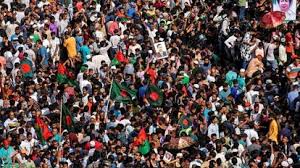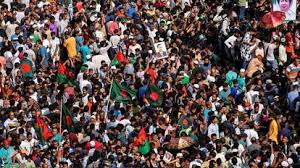
In recent times, the situation of Hindus in Bangladesh has attracted significant attention due to reports of violence and persecution. The Vishwa Hindu Parishad (VHP), a prominent Hindu nationalist organization in India, has raised concerns over the safety and security of Hindus in Bangladesh and urged the Indian government to take proactive measures to address the situation. This article explores the background of the VHP’s call to action, the context of the Hindu minority in Bangladesh, and the potential implications for regional diplomacy and international relations.
Table of Contents
Background: The VHP’s Call to Action
Vishwa Hindu Parishad (VHP):
- Organization Overview: The VHP is a Hindu nationalist organization based in India, known for its advocacy of Hindu cultural and religious issues. It has a significant presence in Indian politics and society, often engaging in issues related to Hindu rights and identity.
- Recent Activism: The VHP’s recent statements reflect its concern for the welfare of Hindus in neighboring countries, particularly Bangladesh, where there have been reports of violence against the Hindu minority.
Call for Government Action:
- Request to the Centre: The VHP has called upon the Indian government to take effective measures to protect Hindus in Bangladesh. This request includes diplomatic pressure on the Bangladeshi government, humanitarian assistance, and international advocacy.
- Specific Measures: The VHP has suggested several actions, including:
- Diplomatic Engagement: Advocating for India to use diplomatic channels to address the concerns of the Hindu minority in Bangladesh and press for stronger protective measures.
- Humanitarian Support: Providing humanitarian aid to affected communities and facilitating the relocation of individuals who are in immediate danger.
- International Advocacy: Engaging with international organizations and human rights bodies to highlight the plight of Hindus in and seek broader support.
Context: Hindu Minority in Bangladesh
Demographic and Social Overview:
- Minority Status: Hindus constitute a minority , making up approximately 8-10% of the population. The majority of Bangladesh’s population is Muslim, and the minority status of Hindus often places them in vulnerable positions.
- Cultural and Religious Life: Hindus have a rich cultural and religious heritage, contributing significantly to the country’s diversity. However, their minority status sometimes results in social and political challenges.
Reports of Violence:
- Recent Incidents: There have been various reports of violence against Hindus in Bangladesh, including attacks on temples, homes, and individuals. These incidents have often been linked to broader political and social tensions.
- Patterns of Persecution: The violence against Hindus in Bangladesh is part of a broader pattern of persecution and discrimination that has been observed periodically. This includes issues such as forced conversions, property disputes, and social ostracism.
Government Response:
- Bangladeshi Government’s Actions: The Bangladeshi government has occasionally taken steps to address incidents of violence against minorities. However, critics argue that these measures are often insufficient or delayed, and there are calls for more decisive action.
- International and Domestic Criticism: The situation has drawn criticism from various international and domestic sources, including human rights organizations and advocacy groups, who call for stronger measures to protect minorities and uphold their rights.
Implications of the VHP’s Request
Diplomatic Relations:
- India-Bangladesh Relations: The VHP’s call for Indian government intervention could impact diplomatic relations between India and Bangladesh. While both countries share a cooperative relationship in many areas, issues related to minority protection can create diplomatic sensitivities.
- Regional Diplomacy: India’s actions in response to the VHP’s request could influence regional diplomatic dynamics and affect how Bangladesh and other neighboring countries perceive India’s role in regional affairs.
Humanitarian and Legal Aspects:
- Humanitarian Assistance: Providing humanitarian aid and support to affected communities aligns with broader international norms of protecting vulnerable populations. However, the logistics and effectiveness of such assistance can be challenging.
- Legal and Ethical Considerations: India’s involvement in addressing the situation in Bangladesh raises legal and ethical questions, including respect for national sovereignty and the appropriate role of external actors in domestic issues.
Impact on Minority Communities:
- Security and Protection: Effective measures to protect Hindus in Bangladesh could help improve their security and well-being. It also has the potential to strengthen the sense of safety and belonging among minority communities.
- Social Cohesion: Addressing violence and persecution against minorities can contribute to broader social cohesion and promote a more inclusive and tolerant society.
International and Human Rights Advocacy:
- Role of International Bodies: Engaging with international organizations and human rights bodies can amplify the call for protection and support for minorities. This can lead to increased international attention and pressure on relevant authorities.
- Advocacy and Awareness: The VHP’s efforts to raise awareness and advocate for action contribute to highlighting the plight of minorities and fostering a broader discourse on human rights and religious tolerance.
Conclusion: Navigating a Complex Situation
The VHP’s call for the Indian government to take effective steps to protect Hindus in Bangladesh underscores the complexities of addressing minority issues in a regional and international context. The situation reflects broader concerns about minority rights, religious freedom, and the role of diplomatic and humanitarian intervention.
As the Indian government considers its response, it must navigate the delicate balance between advocating for minority rights and maintaining diplomatic relations with Bangladesh. The outcome of this situation will have implications for regional diplomacy, humanitarian efforts, and the broader discourse on human rights and religious tolerance.
Ultimately, ensuring the protection and well-being of minority communities requires coordinated efforts at multiple levels, including diplomatic engagement, humanitarian assistance, and international advocacy. The VHP’s call to action highlights the ongoing need for vigilance and action to address issues of persecution and discrimination and to promote a more inclusive and just society..








